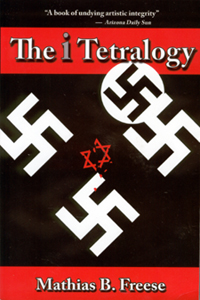The i Tetralogy
Mathias B. Freese
By Alyce Wilson
More than half a century after the end of World War II, when hundreds
of books have been written and movies made about the horrors of the
Holocaust, why should you read The i Tetralogy, a book that delves
into the psychologically crippling world of the concentration camp?
Because you have never read anything like this.
In The i Tetralogy, author and psychotherapist Mathias Freese
provides a deeply subjective view of life in a concentration camp, first
in the voice of an unnamed prisoner, then in the voice of one of the
guards. Thus, it provides an unflinching view of the brutality and degradation
inside those camps, and how it might have affected both those who were
sent to them, as well as those who served as guards.
The book doesn't stop there. It examines the pathology of modern civilization,
examining the Freudian subtext of the relationship between oppressed
and oppressor.
This is not light reading; it is, indeed, disturbing. A more mainstream
work, the film The Pianist by director Roman Polanski, himself
a World War II Holocaust survivor, is quiet and poetic by comparison.
Polanski said he found it important not to exaggerate details but, instead,
to show them as he and other survivors remembered them.
Freese, however, is not a survivor of the Holocaust, so in a Q&A
appendix to the book, he addresses some of the questions his work has
raised. He defends his use of harsh language and unrelenting detail,
writing, "The litany of horrors was substantiated by the Nuremberg
War Crimes Tribunal and has been recited by world-class scholars and
historians ever since." Confronting the ugliness, he feels, is
the best way to heal. He adds that he writes about the Holocaust, because
"I want to understand why people do what they do, sometimes in
such horrific ways."
Freese worries that we will grow so familiar with these stories that
we will no longer hear them. Just think of how lightly the term "Nazi"
is bandied about in pop culture, and you'll understand.
While it's become a cliché to call a work haunting, this book
will stay with you. Reading this book, you feel as if you have entered
the minds of the people involved in this tragedy, and witnessed through
them the impact of those events, not just for Holocaust survivors but
for all of society, today and into the future.
The i Tetralogy excoriates the vicious reality of the Holocaust,
refusing to temper it with the dreaminess of time, much as if you were
treating a pernicious form of cancer. In order to heal, you cannot simply
hope the cancer will heal; you must identify the scope of the problem
and then surgically remove it. If we do not confront the horror of the
Holocaust, if we do not face up to its reality, we cannot remove that
cancer, and it will only linger and grow.
Rating: **** (Must Read) (Beware of explicit violence and sexuality)
Hats Off Books, 2005: ISBN 1-58736-404-2
|

